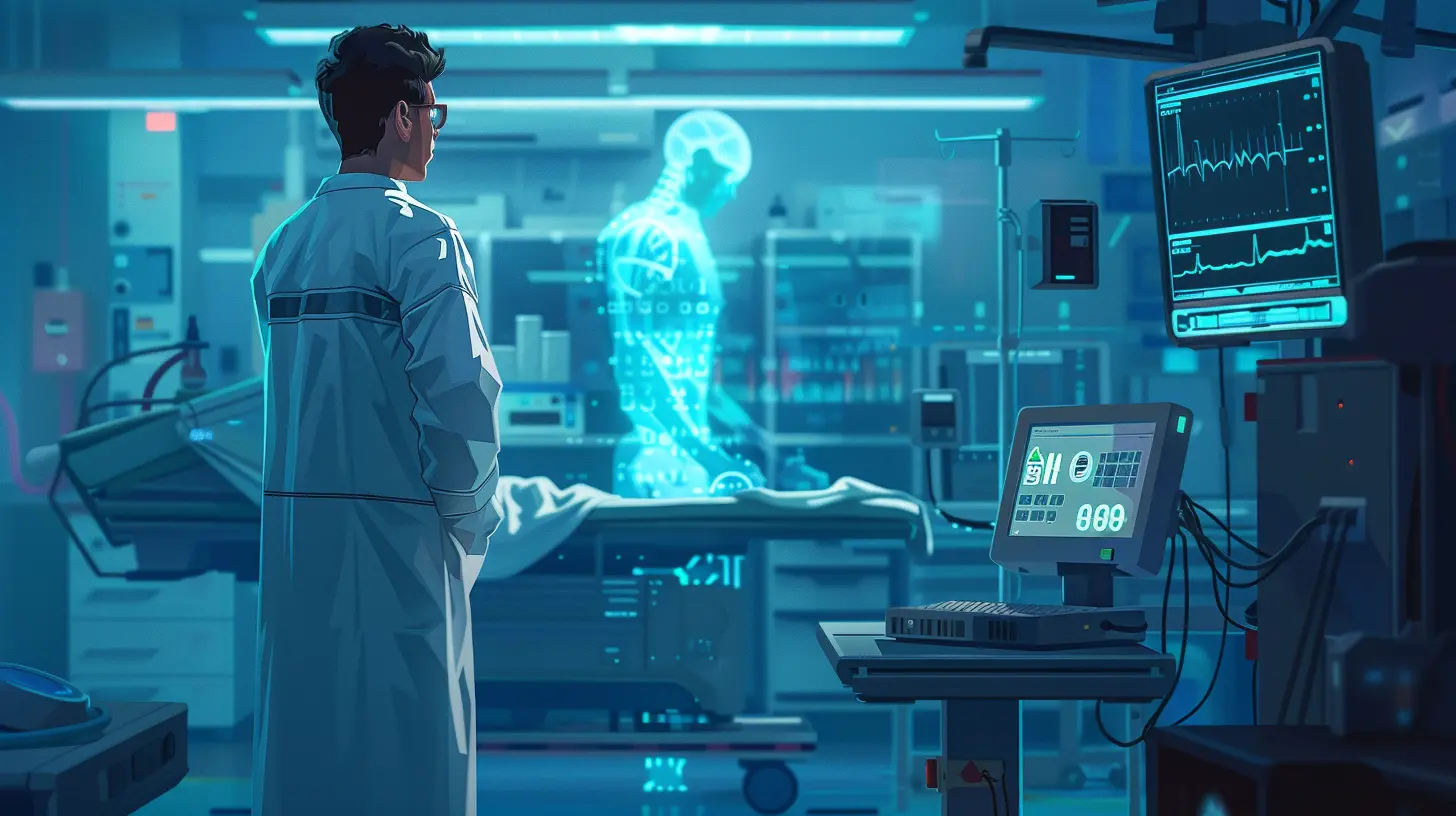The Integration of AI in Future Healthcare Solutions
2 February 2025
Artificial Intelligence (AI) is no longer just a buzzword. It's rapidly transforming the way we live, work, and even stay healthy. The integration of AI in healthcare is not just a future possibility—it’s happening right now. And as it continues to evolve, the implications are nothing short of revolutionary. From diagnosing diseases to personalizing treatment plans, AI is set to reshape the entire healthcare landscape.
But what does the future hold? How will AI impact healthcare solutions in the years to come? And what challenges lie ahead? Let’s dive into the fascinating world of AI in healthcare and explore how this cutting-edge technology is redefining patient care.
Table of Contents
1. What is Artificial Intelligence in Healthcare?2. The Role of AI in Healthcare Today
3. AI-Powered Diagnostics
4. AI in Personalized Medicine
5. AI and Robotic Surgery
6. AI’s Role in Drug Discovery
7. The Future of AI-Powered Healthcare
8. Challenges and Ethical Considerations
9. Conclusion

What is Artificial Intelligence in Healthcare?
Before we dive into the specifics, let’s clear up what AI in healthcare actually means.Artificial Intelligence refers to machines or software that can perform tasks that typically require human intelligence. This includes things like learning from data (machine learning), recognizing patterns (deep learning), and even decision-making. In healthcare, AI is used to analyze medical data, assist in decision-making, and provide recommendations based on vast amounts of information.
Think of AI as the super-smart assistant you never knew you needed. It can sift through mountains of medical data faster than any human doctor ever could, spotting patterns or anomalies that might go unnoticed. But don’t worry, AI is not here to replace doctors—it’s here to help them make better, faster, and more accurate decisions.
The Role of AI in Healthcare Today
AI is already making waves in healthcare, but we’re only scratching the surface. Right now, it’s primarily used in three key areas:1. Diagnostics – AI-powered tools are helping doctors diagnose diseases with greater accuracy.
2. Treatment Recommendations – AI can suggest personalized treatment plans based on a patient’s unique genetic makeup and medical history.
3. Administrative Tasks – AI is streamlining administrative processes like scheduling, billing, and patient record management.
But that’s just the beginning. AI’s potential is vast, and its impact on healthcare will only grow in the coming years. According to a report by Gartner, AI in healthcare is expected to grow at an annual rate of 41.4% over the next few years. The future looks incredibly exciting—and a little bit like something out of a sci-fi movie.
AI-Powered Diagnostics
Diagnosing diseases accurately and swiftly is one of the most crucial aspects of healthcare. Misdiagnoses or late diagnoses can lead to severe consequences, and unfortunately, human error is sometimes a factor. This is where AI can step in and change the game.How AI is Improving Diagnostics
AI systems, particularly those that use machine learning algorithms, can analyze images, scans, and patient data to detect diseases at an early stage. For instance, AI algorithms are already being used to detect abnormalities in medical images like X-rays, CT scans, and MRIs. These systems can spot patterns that might be invisible to the human eye, allowing for early detection of diseases like cancer, heart conditions, and neurological disorders.One standout example is Google's DeepMind, which developed an AI system capable of detecting over 50 different eye diseases by analyzing retinal scans. The system can diagnose these conditions as accurately as some of the world’s top ophthalmologists.
Real-World Application in Radiology
Radiologists are increasingly relying on AI to assist in interpreting medical images. By leveraging deep learning models, AI can scan thousands of images in seconds, highlighting areas of concern for human experts to review. This not only speeds up the diagnostic process but also enhances accuracy.In fact, studies have shown that AI systems can sometimes outperform human radiologists when it comes to detecting certain conditions, such as lung cancer on CT scans. But again, it’s not about replacing doctors; it’s about giving them powerful tools to improve patient outcomes.
AI in Personalized Medicine
No two patients are the same, and one-size-fits-all treatment plans can sometimes fall short. AI is helping to usher in an era of personalized medicine, where treatment is tailored to the individual.AI and Genomics
One of the most exciting areas of AI in healthcare is its role in genomics—the study of an individual’s genes and their interaction with the environment. By analyzing a patient’s genetic makeup, AI can help predict how they might respond to different treatments, allowing doctors to tailor therapies specifically for them.For example, AI algorithms can analyze vast amounts of genetic data to identify mutations that may increase a patient’s risk of developing certain diseases, like cancer or Alzheimer’s. Armed with this information, doctors can develop personalized treatment plans to manage or even prevent these conditions.
AI and Predictive Analytics
Predictive analytics is another area where AI is making a big impact. By analyzing historical patient data, AI can predict future health outcomes with remarkable accuracy. For instance, AI can predict which patients are at risk of developing complications after surgery, allowing doctors to take preventive measures before problems arise.This is like having a crystal ball that helps doctors foresee and avert potential health crises before they happen. How cool is that?
AI and Robotic Surgery
Surgical procedures, especially those that are complex and intricate, require incredible precision. Even the steadiest hands can sometimes falter, which is why robotic surgery is gaining traction. But here’s where it gets even more interesting: AI is making robotic surgery smarter.Enhanced Precision with AI-Guided Robots
AI-powered robots can assist surgeons by providing real-time data during operations. These robots can analyze a patient’s anatomy and offer guidance on the best surgical approach. Some AI systems are even capable of performing certain tasks autonomously, such as making precise incisions or sutures.For example, the da Vinci Surgical System, which is one of the most advanced robotic surgical systems, uses AI to assist surgeons during minimally invasive surgeries. By enhancing a surgeon’s precision, AI reduces the margin for error and shortens recovery times for patients.
The Future of Autonomous Surgery
While we’re not quite at the point where robots are performing surgeries entirely on their own, the future of autonomous surgery is not far off. AI systems are continually learning and improving, and it’s likely that fully autonomous surgical robots will be a reality in the near future.Imagine a world where life-saving surgeries are performed by AI-powered robots with unparalleled precision. That’s the kind of future AI is helping to create.
AI’s Role in Drug Discovery
Developing new drugs is a time-consuming and expensive process. It can take years (sometimes decades) for a new drug to make its way from the lab to the pharmacy. But AI is accelerating the process and helping pharmaceutical companies develop new treatments faster than ever before.Speeding Up Drug Development
By analyzing vast datasets of chemical compounds and their effects on the human body, AI can identify potential new drugs and predict how they might work. This significantly speeds up the research and development process, potentially shortening the time it takes to bring new drugs to market.For instance, AI was instrumental in the search for COVID-19 treatments. Several pharmaceutical companies used AI algorithms to quickly analyze existing drugs and identify candidates that could potentially be repurposed to treat the virus.
Reducing Costs
Not only does AI speed up the drug discovery process, but it also reduces costs. Traditional drug development is an expensive endeavor, often costing billions of dollars. AI can streamline this process by identifying promising drug candidates early on, reducing the need for costly and time-consuming human trials.The Future of AI-Powered Healthcare
So, what does the future hold for AI in healthcare? It’s safe to say that AI will continue to play a transformative role in every aspect of healthcare, from diagnostics to treatment and beyond.AI in Preventive Healthcare
One of the most exciting possibilities is the role AI could play in preventive healthcare. By analyzing a patient’s genetic data, medical history, and lifestyle factors, AI could predict future health problems before they occur. This would allow healthcare providers to take preventive measures, potentially stopping diseases in their tracks before they have a chance to develop.AI and Healthcare Access
AI could also help address disparities in healthcare access. In many parts of the world, there is a shortage of healthcare providers, particularly in rural and underserved areas. AI-powered tools, such as telemedicine platforms and diagnostic apps, could help bridge this gap by providing remote access to healthcare services.Challenges and Ethical Considerations
While the potential benefits of AI in healthcare are enormous, there are also significant challenges and ethical considerations to keep in mind.Data Privacy Concerns
One of the biggest concerns surrounding AI in healthcare is data privacy. AI systems rely on vast amounts of patient data to function effectively. Ensuring that this data is kept secure and private is paramount. Healthcare providers and AI developers must work together to implement robust security measures and comply with regulations like HIPAA and GDPR.Ethical Decision-Making
Another challenge is ensuring that AI systems make ethical decisions. AI algorithms are only as good as the data they’re trained on, and biased data can lead to biased outcomes. For example, if an AI system is trained on data from a predominantly male population, it may not perform as well when diagnosing diseases in women. Ensuring fairness and transparency in AI decision-making is crucial.Conclusion
The integration of AI in future healthcare solutions is nothing short of transformative. From diagnosing diseases with greater accuracy to personalizing treatment plans and even assisting in surgery, AI is revolutionizing the way we approach healthcare. While challenges remain—particularly around data privacy and ethical considerations—the potential benefits far outweigh the risks.As AI continues to evolve, the future of healthcare looks incredibly bright. So, the next time you visit your doctor, don’t be surprised if there’s an AI algorithm analyzing your X-ray or helping to develop your treatment plan. The future is here, and it’s powered by AI.
all images in this post were generated using AI tools
Category:
Future TechAuthor:

John Peterson
Discussion
rate this article
18 comments
Kyle McAndrews
Inspired by the future of healthcare!
March 26, 2025 at 11:35 AM

John Peterson
Thank you! Excited to see how AI will transform healthcare for the better.
Veda Riley
This article highlights the transformative potential of AI in healthcare, showcasing how it can enhance diagnostics, streamline operations, and personalize patient care. Emphasizing collaboration between technology and medical professionals is crucial for successful integration. Exciting times lie ahead as we innovate for improved health outcomes and patient experiences!
March 7, 2025 at 3:27 AM

John Peterson
Thank you for your insightful comment! I completely agree that collaboration between AI and healthcare professionals will be key to unlocking its full potential for enhancing patient care and outcomes. Exciting times indeed!
Cora McCaffrey
Exciting times ahead! AI will revolutionize healthcare solutions!
March 5, 2025 at 4:12 AM

John Peterson
Thank you! We're optimistic about the transformative potential of AI in healthcare. Stay tuned for more insights!
Vesper McIlwain
Exciting times ahead! The fusion of AI and healthcare promises to enhance patient care and streamline processes. Can't wait to see how it evolves!
March 2, 2025 at 12:08 PM

John Peterson
Thank you! We're equally excited about the potential of AI to transform healthcare for the better. Stay tuned for more developments!
Xander Rios
Sure, AI in healthcare sounds glamorous, but let’s not kid ourselves—it's not some magical solution. We’re talking algorithms, not superheroes. Until we sort out ethics and data privacy, it's like putting a sleek sports car in the hands of a toddler. Buckle up, folks!
February 27, 2025 at 3:54 AM

John Peterson
You're absolutely right—AI in healthcare is not a cure-all. Addressing ethics and data privacy is crucial for responsible implementation. Thank you for highlighting these important considerations!
Runehart McLemore
What an exciting time for healthcare! The integration of AI promises to revolutionize patient care, making it more efficient and personalized. I can’t wait to see how these innovations enhance our well-being and transform the medical landscape!
February 26, 2025 at 11:23 AM

John Peterson
Thank you! It's indeed an exciting era for healthcare, and we're eager to explore how AI will enhance patient care and transform the industry.
Luella McAdoo
This article effectively highlights the transformative potential of AI in healthcare. By improving diagnostics and personalizing treatment plans, AI can enhance patient outcomes and streamline operations. However, ethical considerations and data privacy must remain central to these advancements to ensure equitable access and trust.
February 25, 2025 at 12:23 PM

John Peterson
Thank you for your insightful comment! I completely agree that while AI offers promising advancements in healthcare, addressing ethical considerations and ensuring data privacy are crucial for fostering trust and equitable access.
Rayna Reilly
Great insights! Excited to see AI's potential in healthcare.
February 24, 2025 at 1:37 PM

John Peterson
Thank you! I'm excited too about the transformative potential of AI in healthcare.
Craig Holland
This article beautifully captures the potential of AI to transform healthcare, offering hope for better patient outcomes.
February 23, 2025 at 3:53 AM

John Peterson
Thank you for your kind words! I'm glad you found the article inspiring about AI's transformative role in healthcare.
Mara McElhinney
In the dawn of care, where circuits weave, AI whispers solace, a heart to believe. With each pulse of data, futures align, Healing and hope, in harmony entwined. A symphony of science, where compassion reigns— Tomorrow’s embrace, where wellness sustains.
February 22, 2025 at 1:57 PM

John Peterson
Thank you for your poetic insight! It beautifully captures the transformative potential of AI in healthcare, emphasizing the harmony between technology and compassion.
Hope McFadden
The integration of AI in healthcare promises transformative advancements, enhancing diagnostic accuracy and personalizing patient care. However, ethical considerations and data privacy must guide its implementation to ensure trust and equity in future health solutions.
February 18, 2025 at 1:47 PM

John Peterson
Thank you for highlighting the crucial balance between innovation and ethics in AI healthcare integration. Ensuring trust and equity is essential for maximizing its benefits.
Storm Sharpe
This article effectively highlights the transformative potential of AI in healthcare. By streamlining diagnostics, personalizing treatment plans, and enhancing patient care, AI can significantly improve outcomes and efficiency. It's crucial to address ethical considerations and ensure equitable access as we embrace these innovative technologies in healthcare.
February 15, 2025 at 12:22 PM

John Peterson
Thank you for your insightful comment! I completely agree that while AI offers immense potential to enhance healthcare, addressing ethical considerations and ensuring equitable access is essential for its successful integration.
Zayden Sheppard
This article provides valuable insights into AI's transformative role in healthcare. It highlights the potential for improved patient outcomes and efficiency, but further discussion on ethical considerations and data privacy would enrich the conversation.
February 12, 2025 at 8:29 PM

John Peterson
Thank you for your insightful comment! I agree that discussing ethical considerations and data privacy is crucial as we explore AI's potential in healthcare. Your feedback will help shape future discussions.
Indigo McClain
The integration of AI in healthcare promises transformative advancements, enhancing diagnostics and patient outcomes. However, it also raises ethical concerns regarding data privacy and algorithmic bias. A balanced approach is crucial to harness AI's potential while ensuring equitable access and maintaining patient trust in these evolving technologies.
February 10, 2025 at 12:20 PM

John Peterson
Thank you for highlighting the promise and challenges of AI in healthcare. A balanced approach is indeed essential to maximize benefits while addressing ethical concerns and ensuring patient trust.
Nolan Pace
AI: Your future doctor's quirky sidekick!
February 9, 2025 at 4:19 AM

John Peterson
Thanks for your comment! AI's role in healthcare is indeed evolving, and a quirky sidekick might just bring a fun and innovative approach to patient care.
Winona McKee
As AI weaves deeper into healthcare, a question lingers: will it enhance our humanity or eclipse it? The future holds potential, but at what cost to our essence?
February 5, 2025 at 5:05 AM

John Peterson
The integration of AI in healthcare has the potential to enhance our humanity by improving patient care and outcomes, but we must remain vigilant to ensure technology complements rather than replaces the human touch. Balancing innovation with empathy will be key.
Summer McCracken
This article highlights the promising potential of AI in healthcare, showcasing both its ability to enhance diagnostics and streamline operations. However, it’s crucial to address ethical concerns and data privacy issues as we integrate these technologies. A balanced approach will ensure that advancements benefit both patients and healthcare providers.
February 4, 2025 at 7:44 PM

John Peterson
Thank you for your insightful comment! I completely agree that while AI holds great promise in healthcare, addressing ethical and data privacy concerns is essential for responsible integration. A balanced approach will indeed benefit all stakeholders involved.
Meredith Hall
AI-driven healthcare can enhance efficiency and patient outcomes significantly.
February 3, 2025 at 1:42 PM

John Peterson
Absolutely! AI has the potential to streamline processes, reduce errors, and provide personalized care, ultimately improving patient outcomes and overall efficiency in healthcare systems.
MORE POSTS

How Machine Learning Will Predict and Prevent Future Outbreaks

The Power of AI in Predicting Battery Performance

Wearable Tech for Kids: Innovative Gadgets for Safety and Fun

Ultrabooks with Stunning Displays for Movie Lovers

Fintech’s Role in Climate Finance: Investing in a Greener Future

Network Segmentation: Boosting Security Through Isolation

Portable vs. Studio Headphones: What’s the Difference?

Data Lakes vs. Data Warehouses: Which is Right for Your Business?

How Biohacking Will Shape the Future of Human Enhancement

How Robotic Process Automation Can Support Remote Workforces

Self-Healing Materials: The Future of Indestructible Gadgets